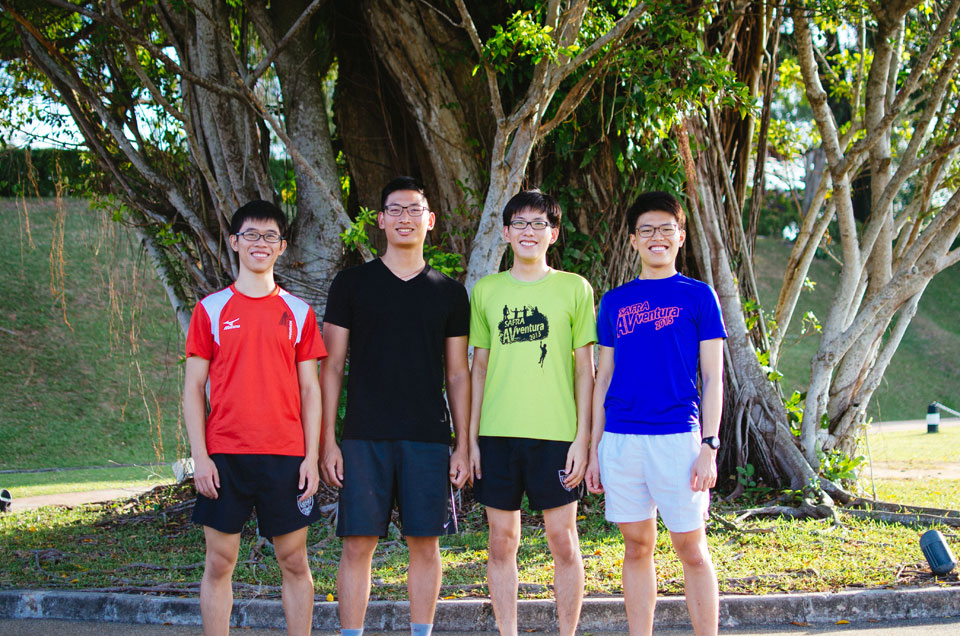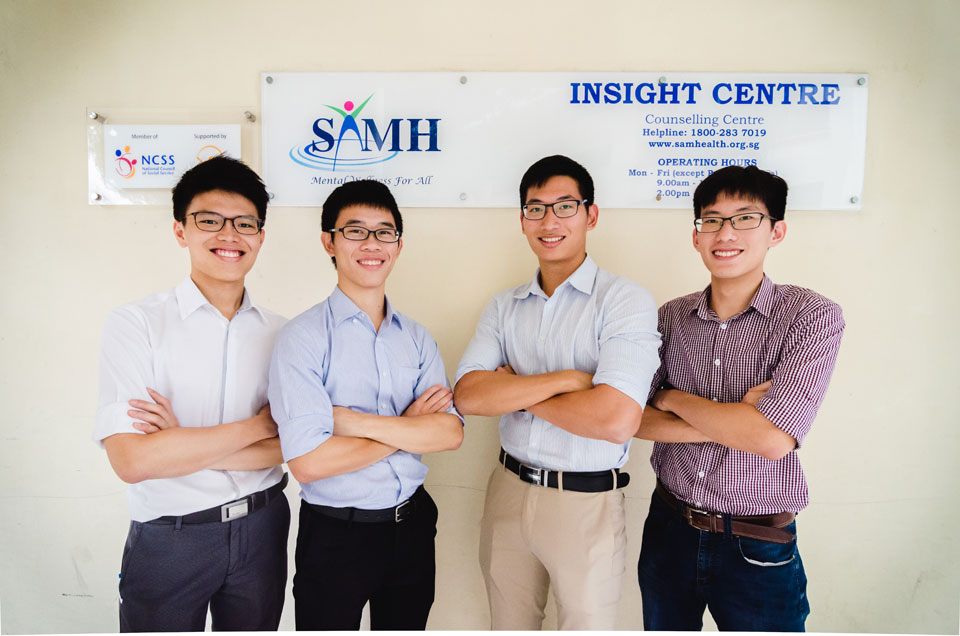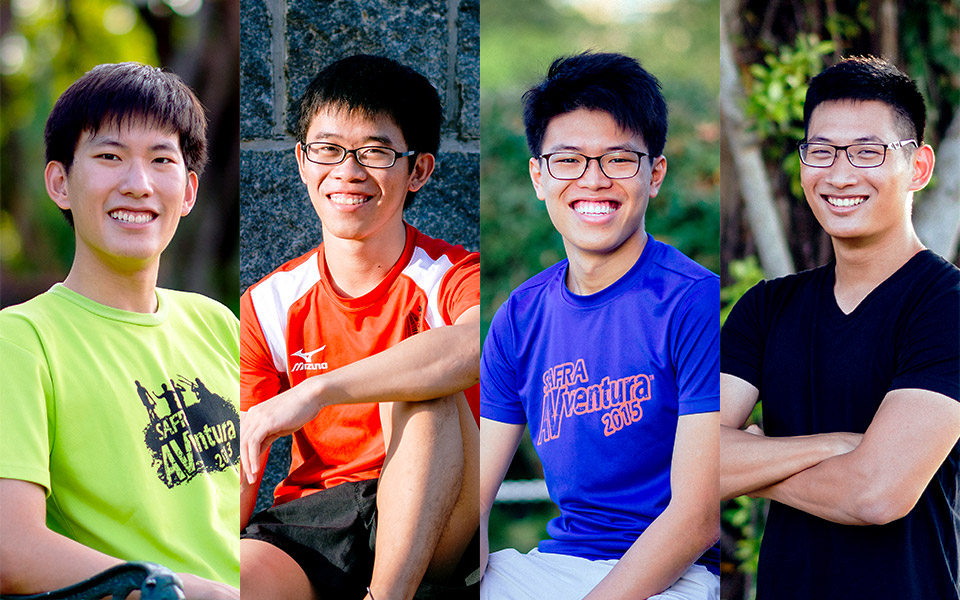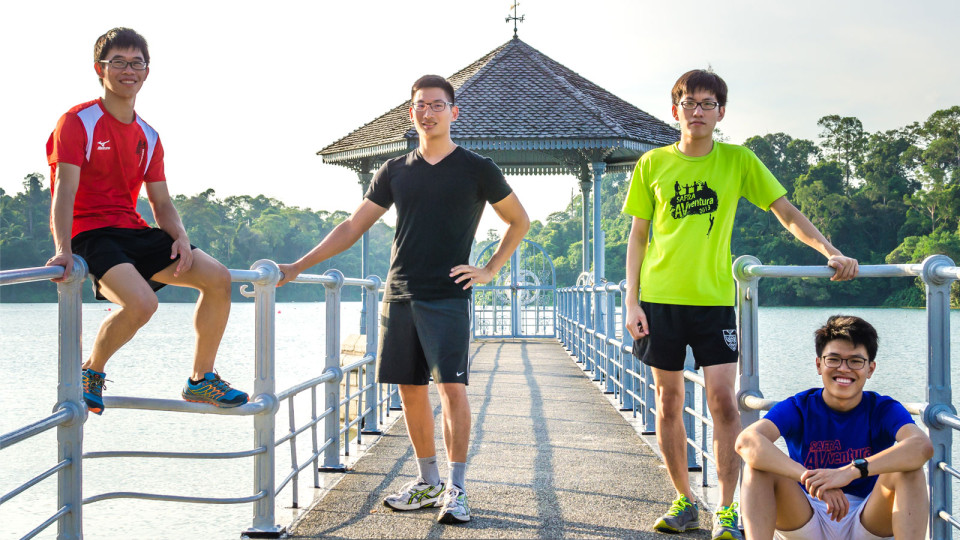How do you find the perfect running mates? Look within your profession. That’s how Team Mental Muscle was born. Four medical students studying at the Yong Loo School of Medicine at the National University of Singapore decided to form a team and they found a worthy cause to motivate their efforts. Dynamic? You bet. Smart? That, too. Besides, if one becomes injured, the other three will be on hand to render a diagnosis!
RS: Would you introduce us to your team?
MM: I’m Nicholas Eu, and my colleagues are Stephen Hwang, Jonathan See and Jon Tan.
RS: How did you four become a team?
Nicholas: We got together in August 2015. We’re all 22-year-old fourth-year medical students who are passionate about physically pushing our limits. That will definitely be the case when we run the 250km Sahara Race in the Namib Desert in 2016. This event will challenge our mental and physical strength and tenacity as individuals and as a team.

RS: How did you come up with the team name Mental Muscle?
Nicholas: We were on a psychiatric posting and were struck by a lack of public awareness about mental health in Singapore, so the name “Mental Muscle” fit. It sends a powerful message: we respect the courage we see in psychiatric patients dealing with their illnesses. Running 250km in the desert heat will not be an easy feat and it will allow us to pay tribute to psychiatric patients who have demonstrated so much bravery and determination in overcoming their illness.
RS: Is there a specific mental health organization you four support?
Nicholas: The Singapore Association for Mental Health (SAMH). SAMH was established in 1968 as the first community-based mental health agency in Singapore offering quality step-down care and rehabilitative services. SAMH does amazing work with modest resources. We plan to raise funds to support outreach, education and rehabilitation programmes.
RS: Have any of you done an ultra or will the Sahara race be your first?
Nicholas: All four of us have competed in various runs and adventure races, but none of us have run an ultra. In fact, most of us have not run a marathon yet. That will change in December when we run the Standard Chartered Marathon together!
RS: As medical students, do you prepare like other runners?
Nicholas: We are focusing on the long distance, the heat and the terrain plus the weight load. To prepare, we run progressively longer distances and with increasing weight loads. We’re incorporating stair climbing to prepare for sand dunes and will add beach runs to get used to sandy, hilly terrain. As the race nears, we will train closer to midday to acclimatise our bodies to the heat.
RS: Is it true that everyone suffers from some form of mental disorder in their lifetime, whether mild or severe?
Nicholas: Everyone will suffer from emotional and psychological distress at some point in their lives, but not everyone will suffer from some form of mental disorder in their life. However, mental disorders are more common than most people expect; for example did you know that about 1 in 10 people in Singapore will suffer from clinical depression in their life-time?
RS: How can we help Singaporeans who suffer from various mental illnesses?
Nicholas: First, we need to recognize the stigma that’s attached to mental illness. We know that’s not easy to do, but it’s important to understand what mental illness actually encompasses and how pervasive they can be in affecting people’s lives. As medical professionals, we strive to educate and make people aware so Singaporeans are more likely to seek help early.

RS: Can mental illness be prevented?
Nicholas: Although some mental illnesses are not curable, all mental illnesses are certainly treatable. Certain aspects that increase the risk can be modified (such as consumption of drugs, chronic pain and poor family support), while other risk factors cannot be modified (such as genetic factors, gender and age).
Having said this, the effects of mental illnesses can be minimized by seeking treatment early as early intervention tends to give a better long term outlook.
RS: Can people reduce their chances of becoming mentally ill?
Nicholas: As for what people can do to reduce their chances, simple ways would be to not abuse substances, and avoiding great stressors in their life. Having said this it is immensely difficult for people to, for example, reduce their stress or increase family support. Seeing a counsellor can help people manage their stress-coping mechanisms that may also be beneficial in reducing the risk.
RS: What are common mental illness misconceptions?
Nicholas: People tend to say “it’s all in your mind,” or “just get over it,” but mental illnesses are recognised medical illnesses that are indeed treatable. Nobody shuns someone with diabetes or hypertension, and mental health issues should be no different. Another misconception is that mentally ill people are violent and dangerous. In fact, the mentally ill are more likely to be victims of violence rather than perpetrators of violence.
RS: It’s no secret that Singapore is a high-stress nation. How common is mental illness here?
Nicholas: Singapore’s lifetime risk for mood disorders is about the same as other first-world nations. The risk for schizophrenia is slightly lower, but mental illnesses are multi-faceted. Mood disorders can impact between 10- and 20-percent of Singaporeans while schizophrenia affects slightly less than 1-percent of our population. While stress is not always bad, excessive and prolonged stressed is a risk factor for some mental illnesses.
RS: What are the warning signs of mental illness that we should look for?
Nicholas: Common ones are hearing voices or seeing objects that aren’t there. Mental illnesses can manifest as disorganised thinking, lack of interest in hobbies, persistently low mood or anxiety in crowded spaces. The list is huge. Bottom line: if something doesn’t feel right or if someone’s behaviour isn’t normal, it’s best to seek help early so symptoms don’t get worse.
RS: Where can someone go for help in Singapore?
Nicholas: The Institute of Mental Health (IMH) is Singapore’s main psychiatric facility and there are also rehabilitation services and organisations like the Singapore Association for Mental Health, Club Heal and Silver Ribbon Singapore. There are psychiatric departments at Tan Tock Seng Hospital and Singapore General Hospital too.
RS: This question is for each of you: What’s the craziest thing you’ve ever done?
Stephen: At the end of our first year of medical school, a friend and I spontaneously hiked to Mount Everest base camp without much preparation. The view was beautiful. It was cool trekking above the clouds! The Sahara Race next year could replace Everest as the craziest thing I’ve ever done, however.
Jonathan: Where shall I begin? I’d say a 3-day trek through Australia’s Blue Mountains with seven equally unprepared friends qualifies. We carried maps and compasses, but had no guide. It was winter. Nights were freezing. We slept in a cheap tent ill-suited to the Blue Mountains and had to hug all night to stay warm enough to sleep. This crazy adventure also qualifies as my fondest memory ever.
Jon: The most extreme thing I’ve done is sky dive and it was also one of the most enjoyable experiences I’ve had, too. Signing up for the Sahara Race is the craziest thing I’ve done lately. I was excited while filling out the forms, but as I pressed the send button, I said aloud, “What have I done?” I knew there was no turning back.
Nicholas: Like Jonathan, I consider that Blue Mountains trip to be one of my most awesome experiences, but I would put skydiving at the top of my crazy list. I recall sitting in that tiny plane and freaking out about falling out—when the whole point of getting on the plane is to fall off! Having said that, signing up to run 250km in desert heat may well top my list once I’ve completed the Sahara Race.

RS: If you four had the power to change one thing, what would it be?
Stephen: I would change the way people view mental illnesses. Prejudice is deeply ingrained in our culture; even my own family and friends were once fearful and judgemental. We can’t change our national thinking overnight, but by working together, change will come and stigmas associated with mental illness can disappear.
Jonathan: People fear darkness because they don’t know what awaits. We fear uncertainty and unpredictability; above all, we fear what we do not understand. If I had the power to change things, I would help people understand one another so mistrust, misgivings and irrational fears that lead to judgements and stigmas are eliminated.
Jon: I would do all I could to eradicate ignorance. Some say ignorance is bliss, but that’s not always the case. We must work together to become conscious of issues we ignore within our bliss bubble. With understanding comes less conflict and less stigma. The world would be a better place if we all stop pretending everything’s blissful.
Nicholas: I would find a way to bring peace to the world—true peace—because there’s nothing superficial about the nature of peace. One must be at peace with oneself, others and the world. When peace prevails, insecurities, envy and regrets disappear—wars, racial and religious conflicts can be resolved. We would not obsess about things we cannot change and people would accept each other unconditionally. Nobody would feel pressured to be someone they’re not.
How do you feel after reading about these four amazing, idealistic and caring men? Do you agree that all types of mental illnesses need to be at the forefront of Singapore conversations to remove the prejudice, shame and stigma attached to them?
Have you ever wondered why we have two hands? It’s simple, One’s for helping yourself, the other for helping others. There is no exercise better for the heart than reaching down and lifting people up. So let’s use our strength to lift the patients who suffer from mental illnesses up by supporting Mental Muscle’s cause. Donations will be made to Singapore Association for Mental Health (SAMH).




